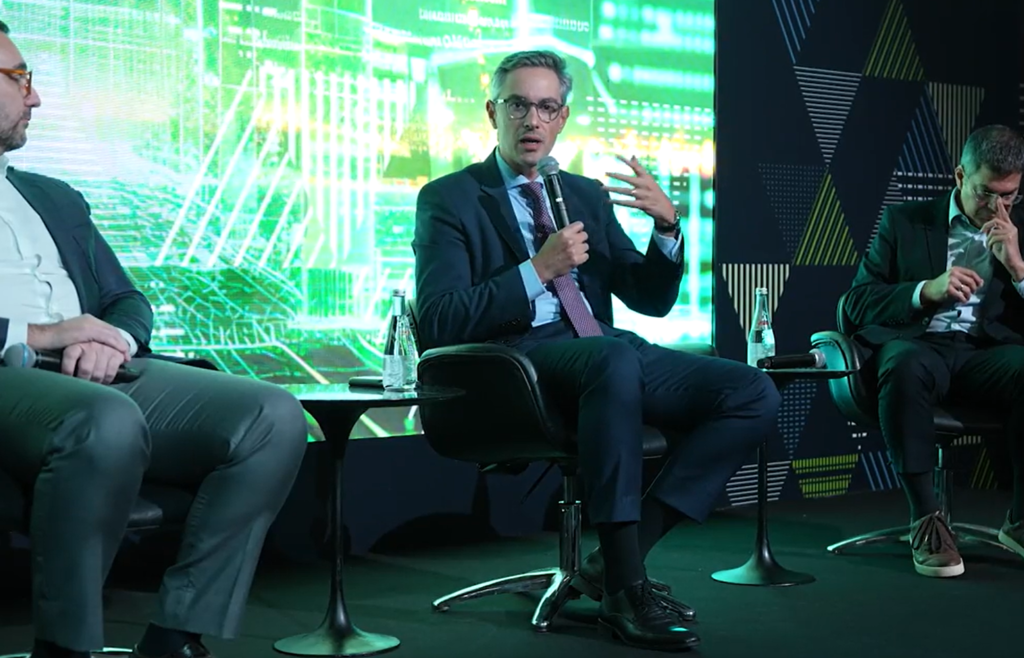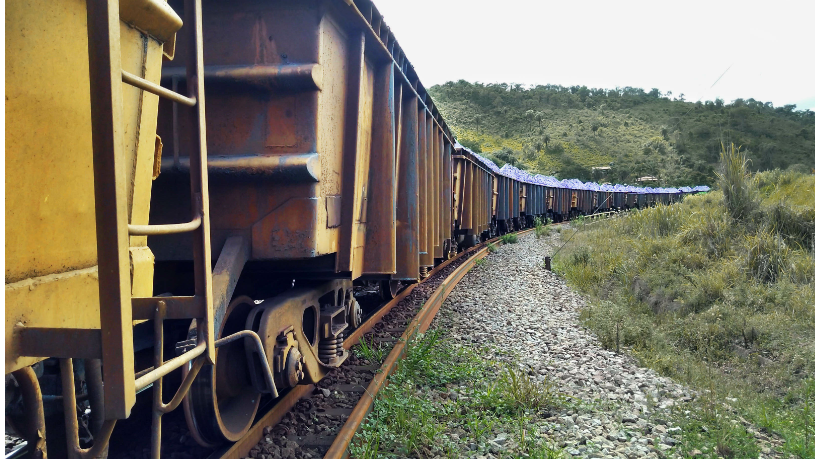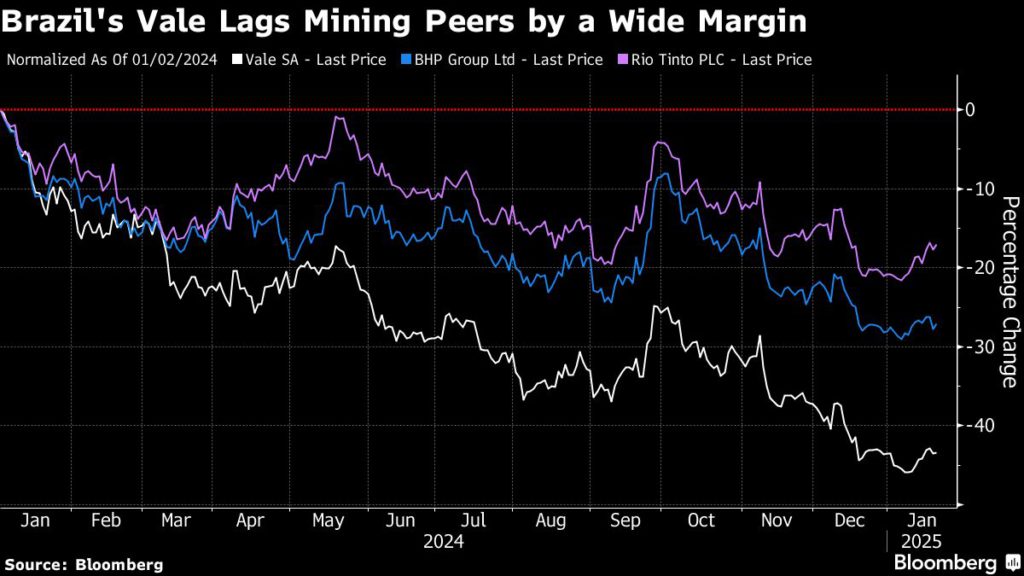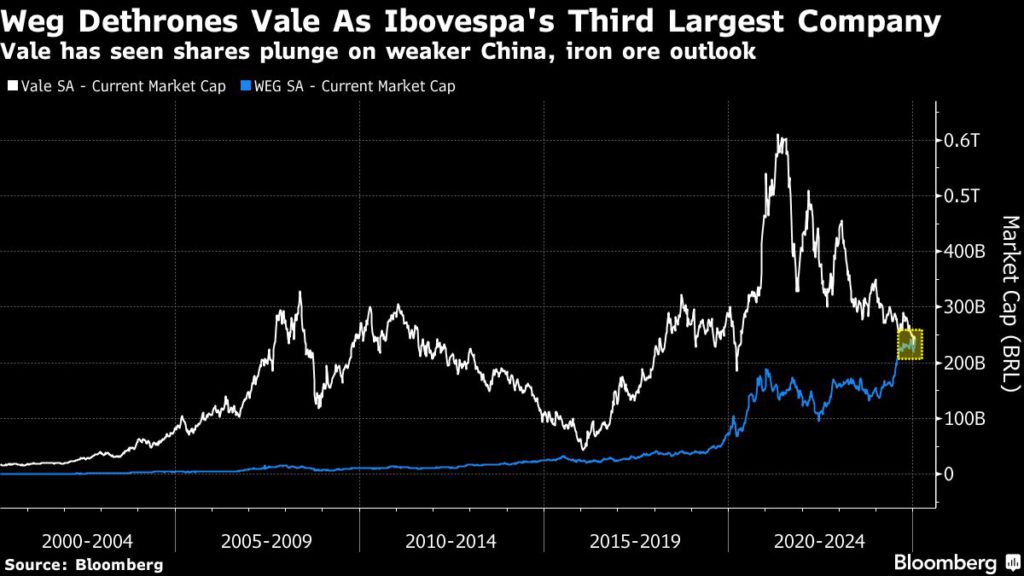Vale CEO meets Brazil’s Lula, touts ‘convergence’ with government agenda
Reuters | January 29, 2025 |

Vale Chief Financial Officer Gustavo Pimenta. (Image courtesy of Vale.)
Brazilian miner Vale’s CEO held his first official meeting with President Luiz Inacio Lula da Silva on Tuesday, the company said, where he highlighted that there was “enormous convergence” between its projects and the country’s development agenda.

Vale chief executive Gustavo Pimenta has been seeking to improve the mining group’s relationship with the government since he took over the job in October replacing Eduardo Bartolomeo.
The company has been criticized by Lula and cabinet members in the past. Lula’s mining minister last year complained about a lack of investment in Brazil and delays to a repair deal over a 2015 dam collapse, which was ultimately sealed in October.
In the meeting with Lula, Pimenta “discussed Vale projects that contribute to boosting Brazil to a global leadership position in the energy transition and decarbonization agenda,” the miner said in a statement late on Tuesday.
“Gustavo Pimenta highlighted his optimism about the company’s future and the certainty that there is enormous convergence between Vale’s strategic projects and Brazil’s development agenda,” the statement said.
A source familiar with the hour-long meeting said Lula told Pimenta that Vale and the government needed to work together, noting that there had been some “noise” in the past but there was no reason for it to happen again.
Vale was privatized in the 1990s. One of its main shareholders includes a pension fund operated by state-run lender Banco do Brasil.
Vale on Tuesday reported its highest annual iron ore production since 2018, even after a decline in output in the fourth quarter when the company prioritized higher-margin products.
(By Marta Nogueira, Lisandra Paraguassu and Gabriel Araujo; Editing by Jane Merriman)
Reuters | January 29, 2025 |

Vale Chief Financial Officer Gustavo Pimenta. (Image courtesy of Vale.)
Brazilian miner Vale’s CEO held his first official meeting with President Luiz Inacio Lula da Silva on Tuesday, the company said, where he highlighted that there was “enormous convergence” between its projects and the country’s development agenda.

Vale chief executive Gustavo Pimenta has been seeking to improve the mining group’s relationship with the government since he took over the job in October replacing Eduardo Bartolomeo.
The company has been criticized by Lula and cabinet members in the past. Lula’s mining minister last year complained about a lack of investment in Brazil and delays to a repair deal over a 2015 dam collapse, which was ultimately sealed in October.
In the meeting with Lula, Pimenta “discussed Vale projects that contribute to boosting Brazil to a global leadership position in the energy transition and decarbonization agenda,” the miner said in a statement late on Tuesday.
“Gustavo Pimenta highlighted his optimism about the company’s future and the certainty that there is enormous convergence between Vale’s strategic projects and Brazil’s development agenda,” the statement said.
A source familiar with the hour-long meeting said Lula told Pimenta that Vale and the government needed to work together, noting that there had been some “noise” in the past but there was no reason for it to happen again.
Vale was privatized in the 1990s. One of its main shareholders includes a pension fund operated by state-run lender Banco do Brasil.
Vale on Tuesday reported its highest annual iron ore production since 2018, even after a decline in output in the fourth quarter when the company prioritized higher-margin products.
(By Marta Nogueira, Lisandra Paraguassu and Gabriel Araujo; Editing by Jane Merriman)
Bloomberg News | January 27, 2025 |

Vale ore-loaded train taken from Itabira Minas Gerais, Brazil. Stock image.
A weaker China economy and battered iron ore prices have helped drive down Vale SA’s stock, making investors wary of uncertainties plaguing one of the world’s top suppliers of the steelmaking ingredient.

A persistent crisis in China’s property sector and its impacts on iron ore — a metal that accounts for roughly 80% of Vale’s revenue — have led investors to trim allocations in the Brazilian company in the past year. That has sent Vale shares to their lowest level since 2020, erasing more than 100 billion reais ($17 billion) in market value in 2024.

The decline has continued this year, causing the Rio de Janeiro-based miner to lose its rank as Brazil’s third-largest publicly traded company.
“There seems to be a bit of fear that you might buy Vale, but then China gets worse and you lose money,” said Florian Bartunek, chief investment officer and co-founder of Constellation Asset Management.
The top 50 biggest mining companies in the world
Vale’s downturn continues even after resolving many issues that soured investor sentiment, including a messy succession battle that ultimately saw finance head Gustavo Pimenta land the chief executive officer role. Vale also reached a settlement for a deadly mining disaster in 2015 and renegotiated a deal with the government for rail access to its key mines last year, ending two other overhangs.
“Unfortunately, now that the company has gotten things fixed, everybody’s worried about China again,” said Josh Rubin, a portfolio manager at Thornburg Investment Management.
About half of Vale’s revenue comes from China. The company shipped 185.5 million metric tons of iron ore to the Asian nation in 2023, almost 60% of Vale’s annual output.
China’s slowing economy has hurt real estate and construction, curbing demand for iron ore just when big miners are boosting global supplies. The price of the steelmaking ingredient fell more than 25% last year, ending December at around $100 a metric ton.
At that price, Vale’s dividend and share buybacks could halve to $2.1 billion this year and operating cashflow would shrink to the lowest since 2016, according to Bloomberg Intelligence.
Iron ore prices bounced back a bit in January on expectations of more stimulus from Beijing, but China is shifting its focus to greener, high-technology growth and consumption — shrinking steel’s importance to its economy.
“Vale’s cash generation scenario is a little worse than its peers,” Humberto Meireles, a portfolio manager at Brazilian hedge fund Vinland Capital, said, adding that there’s uncertainty “about how effective the Chinese government will be in reactivating domestic demand.”

American depository receipts of Vale traded at about 4.6 times estimated earnings, compared with a ratio of 11 times for BHP Group Ltd. and 9.1 times for Rio Tinto Ltd. Both peers have a more diversified portfolio, with the weakening iron ore demand outlook prompting them to push hard into copper and lithium.
Vale shares fell as much as 0.9% in Sao Paulo Monday.
Vale is shifting strategy under its new CEO, selling different iron ore grades to appeal to more customers and developing projects in countries such as Saudi Arabia to diversify. The metals producer also seeks to boost copper and nickel production in Canada, Brazil and Indonesia.
The company last Thursday lost its position as Brazil’s third-largest publicly listed company by market value to Weg SA, a global manufacturer of electrical and industrial equipment. Weg’s stock has jumped 72% in the past 12 months, while Vale shares have plunged by 24%.
Vale declined to comment.

Shareholders aren’t signaling confidence in Vale’s stock rebounding anytime soon. Shares have extended last year’s decline, falling 2.3% since the start of January. Earlier in the month, billionaire Rubens Ometto’s conglomerate Cosan SA unloaded a 4.1% stake in Vale at a loss — the value of its investment fell 34% since the firm bought the stock in 2022.
Brazil’s own issues have also weighed on Vale. The country’s currency and equity markets lagged all major peers in 2024, with the real slumping the most since the pandemic on fiscal concerns, and the benchmark Ibovespa stock index falling 10%.
Still, some see a buying opportunity: JPMorgan Chase & Co. analyst Rodolfo Angele reiterated a positive view for Vale in a Jan. 17 note, noting the company is generating solid free cash flow and is well positioned for a weaker Brazilian currency.
“This great disconnect is an opportunity for investors,” he wrote.
(By Leda Alvim and Mariana Durao)
Read More: Vale Base Metals reviews potential sale of nickel operations in Manitoba

No comments:
Post a Comment